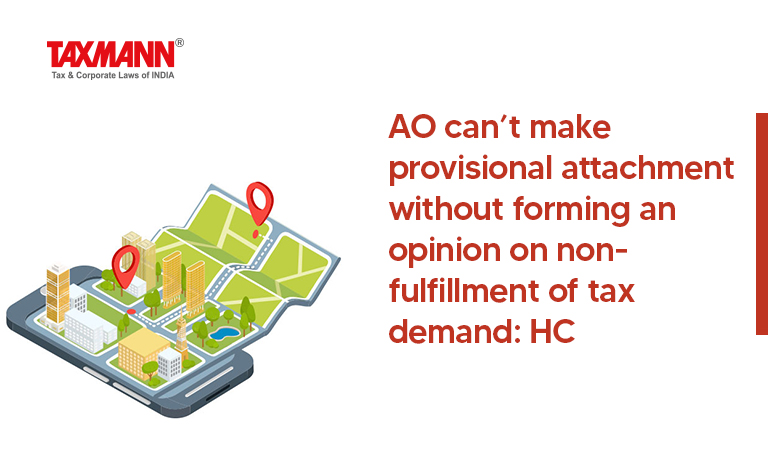AO can’t make provisional attachment without forming an opinion on non-fulfillment of tax demand: HC
- Blog|News|Income Tax|
- 2 Min Read
- By Taxmann
- |
- Last Updated on 20 April, 2022

Case Details: Indian Minreals and Granite Co. v. DCIT - [2022] 137 taxmann.com 119 (Karnataka)
Judiciary and Counsel Details
-
- S.R. Krishna Kumar, J.
- M.V. Seshachala, Sr. Counsel, Gangadhar J.M. and Praveen P. Tarikar, Advs. for the Petitioner.
- Y.V. Raviraj, Adv. for the Respondent.
Facts of the Case
A search under section 132 was conducted upon the assessee pursuant to which assessment proceedings under section 153A were initiated. During said proceedings, the Deputy Commissioner had passed an order to provisionally attach the fixed deposit of the assessee by invoking section 281B.
The assessee filed a writ petition before the Karnataka High Court against such attachment.
High Court Held
The Karnataka High Court held that the exercise of power for order of provisional attachment must necessarily be preceded by the formation of an opinion by the authorities that it is necessary to do so to protect the interest of revenue.
Before passing the provisional attachment order, the commissioner must form an opinion based on tangible material available for attachment that the assessee is not likely to fulfil the demand payment of tax.
In the instant case, except for merely stating that since there is a likelihood of huge tax payments to be raised on completion of assessment and that to protect the revenue, other mandatory requirements and pre-condition have neither been complied with nor fulfilled or followed before passing the order.
Accordingly, the impugned provisional attachment orders do not satisfy the legal requirements and, consequently, said provisional order were cryptic, unreasoned, non-speaking and laconic, same deserve to be quashed.
Case Review
-
- Radha Krishnan Industries v. State of Himachal Pradesh [2021] 127 taxmann.com 26/86 GST 665 (SC) (para 9) followed.
List of Cases Referred to
-
- Radha Krishan Industries v. State of Himachal Pradesh [2021] 127 taxmann.com 26/86 GST 665 (SC) (para 4)
- Sahara India (Firm) v. CIT [2008] 169 Taxman 328/300 ITR 403 (SC) (para 4).
Disclaimer: The content/information published on the website is only for general information of the user and shall not be construed as legal advice. While the Taxmann has exercised reasonable efforts to ensure the veracity of information/content published, Taxmann shall be under no liability in any manner whatsoever for incorrect information, if any.

Taxmann Publications has a dedicated in-house Research & Editorial Team. This team consists of a team of Chartered Accountants, Company Secretaries, and Lawyers. This team works under the guidance and supervision of editor-in-chief Mr Rakesh Bhargava.
The Research and Editorial Team is responsible for developing reliable and accurate content for the readers. The team follows the six-sigma approach to achieve the benchmark of zero error in its publications and research platforms. The team ensures that the following publication guidelines are thoroughly followed while developing the content:
- The statutory material is obtained only from the authorized and reliable sources
- All the latest developments in the judicial and legislative fields are covered
- Prepare the analytical write-ups on current, controversial, and important issues to help the readers to understand the concept and its implications
- Every content published by Taxmann is complete, accurate and lucid
- All evidence-based statements are supported with proper reference to Section, Circular No., Notification No. or citations
- The golden rules of grammar, style and consistency are thoroughly followed
- Font and size that’s easy to read and remain consistent across all imprint and digital publications are applied



 CA | CS | CMA
CA | CS | CMA
